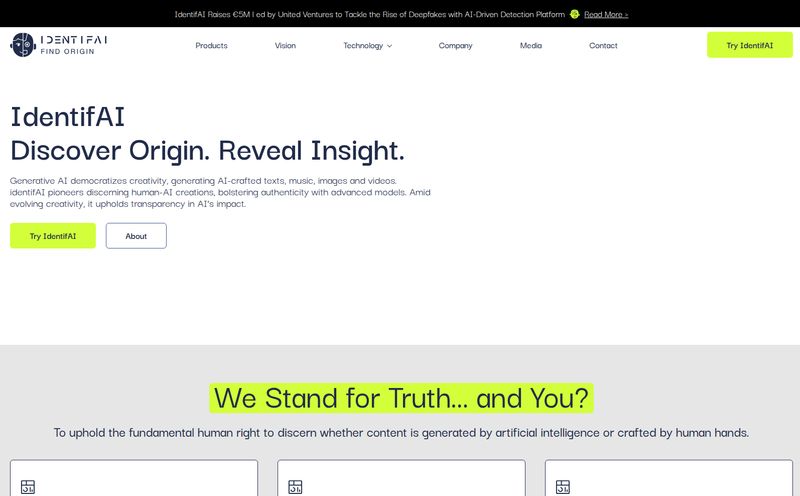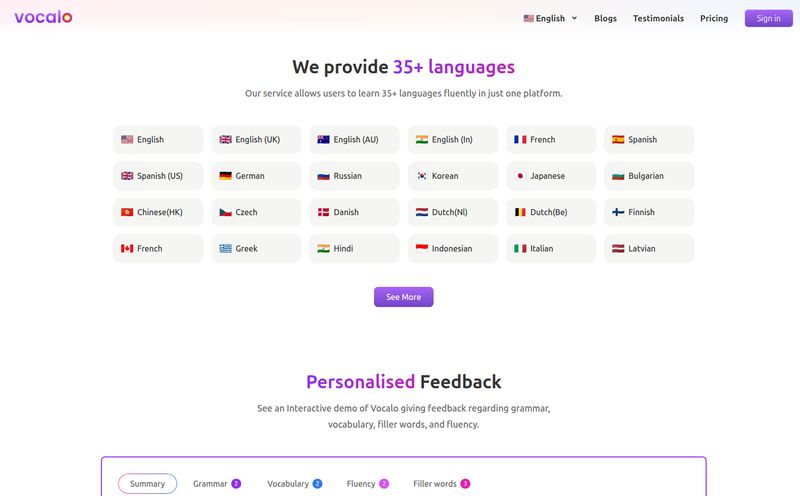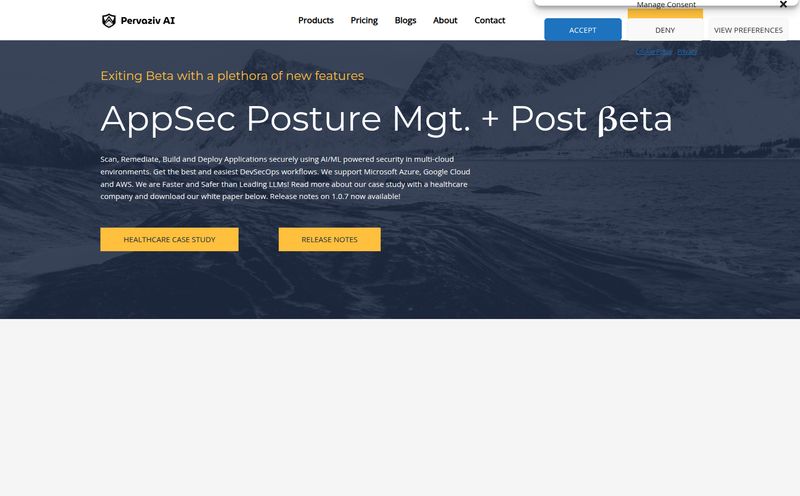We’ve all been there. You’re on a crucial Zoom call. A negotiation, a job interview, maybe even a tense client meeting. You’re trying to read the room, but the "room" is a grid of pixelated faces. Is that a thoughtful pause or a sign they're fabricating an answer? Are they smiling because they agree with your proposal, or is it a mask for something else?
It’s tough. Reading people is hard enough in person; over a video stream, it’s practically a superpower. For years, we've just had to rely on our gut. But what if you could have a data-driven sidekick for that gut feeling?
That's the wild promise of a tool I’ve been experimenting with called LiarLiar.ai. And before we go any further, let's clear something up. If you go looking for it, you might stumble upon liarliar.pro, which, as I write this, is just a domain for sale on GoDaddy. Make sure you head to the correct .ai address. A tiny detail, but it saves you a headache right from the start.
So, What Is This Digital Truth Serum?
At its core, LiarLiar.ai is an artificial intelligence platform designed to sit alongside your video calls on apps like Zoom, Google Meet, and Skype. It's not a spooky sci-fi gadget from a movie. Think of it more like an incredibly observant analyst that watches and listens, picking up on cues that are almost impossible for the human eye and ear to catch in real-time.
It’s constantly analyzing a stream of data points from the person on the other end of the call, including:
- Subtle facial micro-expressions
- Fluctuations in heart rate (yes, really)
- Shifts in body language
- Emotional sentiment
- Consistency in their voice
- Even their choice of words
It then crunches all this data to give you a real-time assessment of potential deception. It’s like giving your intuition a shot of espresso.
How Does This AI “Magic” Actually Work?
Okay, “magic” is a strong word. I’ve been in the SEO and tech game long enough to know there’s always a method behind the madness. It’s not pulling truths out of thin air; it’s all about sophisticated pattern recognition.
The Eyes and The Face
The system tracks tiny, involuntary facial muscle movements—the kind that flash across a face in a fraction of a second. These micro-expressions can often betray a person’s true feelings, even when they’re trying to hide them. We’re talking about the flicker of an eyelid, a slight curling of the lip. Stuff you’d miss if you blinked.
The Heart of the Matter
This is the part that really blew my mind. LiarLiar.ai uses a technology called Remote Photoplethysmography (rPPG). In layman's terms, it uses the webcam to detect imperceptible changes in the color of a person’s skin, which correspond to the flow of blood beneath the surface. From this, it can estimate their heart rate. A sudden, unexplained spike in heart rate can be a strong physiological indicator of stress or deception. According to research published by institutions like the IEEE, this is a legitimate, albeit complex, field of biometric sensing.

Visit LiarLiar.AI
The Sound of Deception
The tool doesn’t just watch; it listens. It analyzes vocal tone and consistency. Is there a sudden change in pitch? Are they speaking faster or slower than their baseline? It also transcribes the conversation (more on the Mac limitations later) to analyze language patterns. Increased use of distancing language or non-committal phrases can sometimes be a tell.
My Experience Putting LiarLiar.ai to the Test
Setting it up was surprisingly straightforward. You install the desktop application, and it integrates with your video call software. The interface is clean and doesn't clutter your screen, which I appreciated. During a call, it provides a subtle, real-time indicator of its analysis—nothing so dramatic that it distracts you from the actual conversation.
I found the post-session reports to be the most valuable part. After a call, you get a comprehensive breakdown with charts and flagged moments. It shows you exactly when the AI detected a potential spike in stress or deception, cross-referenced with the video and transcript. It allowed me to go back and re-evaluate key moments of a conversation with a new layer of data. It’s less of a “Gotcha!” tool and more of a “Hmm, maybe I should follow up on that point” guide.
The Good, The Bad, and The Complicated
What I Liked
The non-invasive nature is a huge plus. There's no bulky hardware or complicated setup. The fact that it's constantly learning and the algorithms are being refined is also a good sign—it’s not a static product. But honestly, the sheer novelty and power of getting this kind of insight is the main attraction. It feels like stepping into the future of communication.
Where It Gets Tricky
Let’s be real: no lie detector is 100% accurate. Not a polygraph, and certainly not an AI. The company is upfront about this, and it's the most important thing to remember. Someone could be nervous for a million reasons that have nothing to do with lying. Maybe their dog is barking in the next room, or they’re just naturally anxious. You absolutely cannot take the AI's output as gospel. It is a data point, not a verdict.
Also, this software is a bit of a resource hog. You'll need a decent computer to run it smoothly alongside your video call without everything grinding to a halt. And a specific note for Apple users: due to Mac OS policies on system audio recording, the automatic transcription feature is disabled. You still get all the video-based analysis, but it's a limitation to be aware of.
The All-Important Question: How Much Does It Cost?
This is where LiarLiar.ai gets really interesting. In an era where every piece of software seems to be a $20/month subscription, they've gone a different route. It's a one-time payment.
| Plan | Price | Includes |
|---|---|---|
| Lifetime Access | $100 | Unlimited sessions, future updates, Mac & Windows support, automatic recordings, and post-session reports for one device. |
For a hundred bucks, you get lifetime access. I had to read that twice. For anyone in a role that involves frequent high-stakes conversations—like recruiters, sales teams, or journalists—that's an incredible value proposition. No recurring fees is a breath of fresh air.
Who Is This Tool Really For?
I see a few clear use cases. HR professionals could use it to add another data layer to their interview process. A salesperson could use it to better gauge a client's true objections during a pitch. I could even see it being used in online poker, though I haven't tried that myself!
Could you use it for personal matters? To see if your friend really likes your new haircut? I suppose. But that leads us into some murky ethical waters. I probably wouldn't recommend running it during a first date. Some things are best left to human intuition, flawed as it may be.
The Elephant in the Room: The Ethics of AI Lie Detection
You can't talk about a tool like this without addressing the ethical side. Is it right to subject someone to this kind of analysis, potentially without their knowledge? Laws around this are still a gray area and vary by location. The most ethical path is transparency—letting the other person know you're using a tool to facilitate better understanding.
More importantly, we have to be vigilant about bias. AI is only as good as the data it’s trained on. Cultural differences in body language, neurodivergence, or simple anxiety could all be misinterpreted by the algorithm. This technology is powerful, but with great power comes the great responsibility to not jump to conclusions. It should be a tool to open up conversations, not end them.
Final Thoughts
LiarLiar.ai is one of the more fascinating pieces of tech I’ve played with recently. It’s not a magic truth-teller, and it shouldn't be treated as one. But as a tool for gaining deeper insight into communication, it's pretty compelling. It’s a powerful assistant that can help you notice things you would have otherwise missed.
Given the shockingly reasonable $100 lifetime price tag, it’s a low-risk investment for any professional who lives and dies by the quality of their conversations. Just promise me you'll use its powers for good, and always, always with a healthy dose of human judgment.
Frequently Asked Questions
Is LiarLiar.ai 100% accurate?
No. No lie detection technology is 100% accurate. The creators are clear that it should be used as a tool for insight, not as a definitive judgment. Factors like stress, anxiety, or cultural differences can influence the results.
Does LiarLiar.ai work on Mac computers?
Yes, the application is compatible with both Windows and Mac OS. However, due to Mac's system policies, the real-time audio transcription feature is currently disabled on Mac. All video-based analysis, like heart rate and facial expression monitoring, works perfectly.
What video call platforms does it work with?
It is designed to be compatible with the most popular video conferencing platforms, including Zoom, Google Meet, and Skype.
Is it legal to use an AI lie detector on someone?
The legality of using such a tool can be a gray area and depends heavily on your location and the context. The most ethical approach is to be transparent and obtain consent. For professional or official use, it's wise to consult with legal counsel.
How much does LiarLiar.ai cost?
It currently offers a lifetime access plan for a one-time payment of $100. This includes unlimited usage, all future software updates, and reporting features for a single device.
Reference and Sources
- LiarLiar.ai Official Website: https://liarliar.ai
- Official Pricing Page: https://liarliar.ai/pricing
- Example of Domain Confusion: liarliar.pro Domain Listing
- Academic Source on rPPG Technology: IEEE Xplore Digital Library



